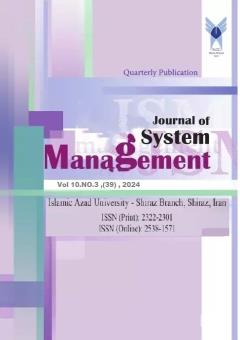An Alternative Prioritization Method in the Presence of Contextual Variables: A case on Gas Companies
محورهای موضوعی : Decision AnalysisMaryeh Nematizadeh 1 , Alireza Amirteimoori 2 , Sohrab Kordrostami 3 , Leila Khoshandam 4
1 - Department of Applied Mathematics, Rasht Branch, Islamic Azad University, Rasht, Iran
2 - Department of Applied Mathematics, Rasht Branch, Islamic Azad University, Rasht, Iran
3 - Department of Applied Mathematics, Lahijan Branch, Islamic Azad University, Lahijan, Iran
4 - Department of Applied Mathematics, Rasht Branch, Islamic Azad University, Rasht, Iran
کلید واژه: Data envelopment analysis, Regression, Contextual variable, Efficiency, Ranking,
چکیده مقاله :
After assessing the efficiency of the units under evaluation, determining their ranking becomes a critical concern for decision-making. Ranking methodologies rely on specific unit inputs and outputs, but some variables affecting unit performance are not directly observable and are termed contextual variables. Thus, the primary objective of this research is to introduce a ranking methodology that incorporates these variables. To achieve this, a two-step approach is employed. Firstly, the Data Envelopment Analysis (DEA) technique calculates efficiency scores for each Decision-Making Unit (DMU), considering its unique inputs and outputs. Subsequently, the linear regression method is applied to assess the impact of contextual variables on efficiency. Finally, efficiency scores are modified by removing the impact of contextual variables, enabling unit ranking. To illustrate this proposed methodology, we conducted a performance evaluation of provincial gas companies in Iran. The evaluation covered four periods, from 2013 to 2016.
After assessing the efficiency of the units under evaluation, determining their ranking becomes a critical concern for decision-making. Ranking methodologies rely on specific unit inputs and outputs, but some variables affecting unit performance are not directly observable and are termed contextual variables. Thus, the primary objective of this research is to introduce a ranking methodology that incorporates these variables. To achieve this, a two-step approach is employed. Firstly, the Data Envelopment Analysis (DEA) technique calculates efficiency scores for each Decision-Making Unit (DMU), considering its unique inputs and outputs. Subsequently, the linear regression method is applied to assess the impact of contextual variables on efficiency. Finally, efficiency scores are modified by removing the impact of contextual variables, enabling unit ranking. To illustrate this proposed methodology, we conducted a performance evaluation of provincial gas companies in Iran. The evaluation covered four periods, from 2013 to 2016.


